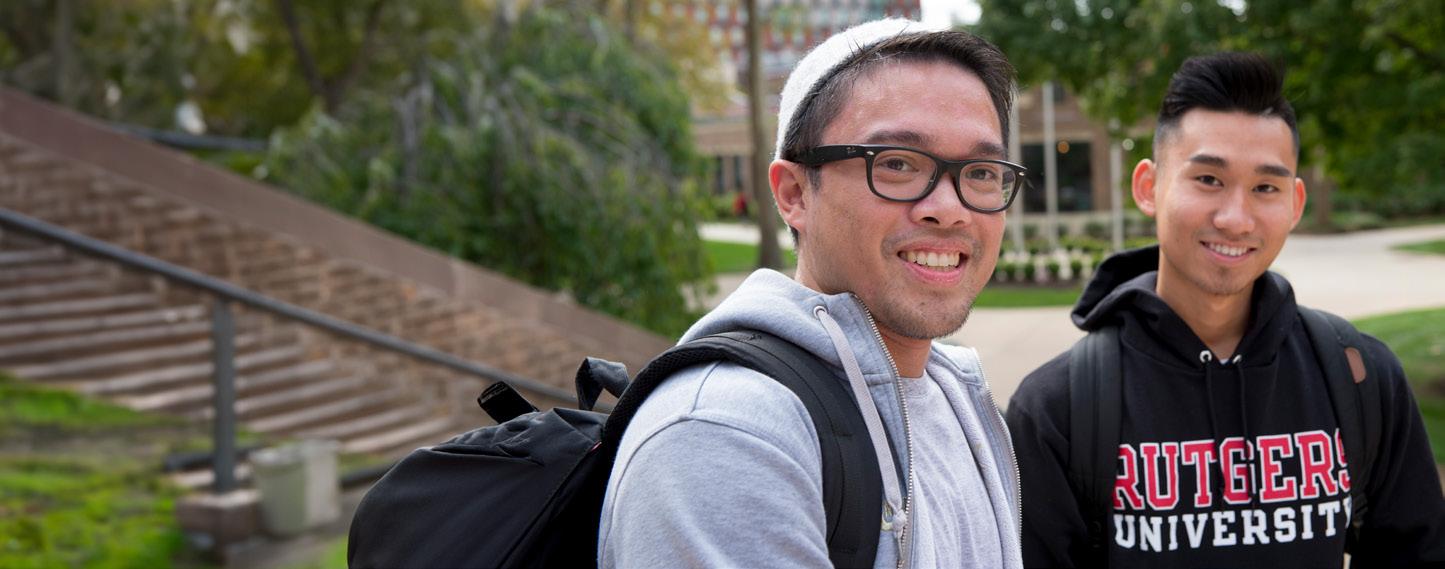
STUDENT ACADEMIC SUCCESS


STUDENT ACADEMIC SUCCESS
The higher education landscape is rapidly evolving, demanding adaptable, skilled, and prepared graduates to contribute to a changing world. At Rutgers University–Camden, the Student Academic Success (SAS) division plays a critical role in equipping students with the tools and support they need to achieve their academic goals and thrive in a dynamic collegiate environment.
We envision a vibrant and inclusive academic community where every student feels empowered to reach their full potential. This strategic plan outlines the key initiatives we will undertake over the next five years to achieve this vision. This strategic plan outlines the goals and objectives for the Division of Student Academic Success at Rutgers University at Camden for the next five years. It is designed to align with the broader university strategic plan and contribute to achieving the university’s mission:
Rutgers University–Camden provides access to world-class education, innovative research, and transformative opportunities to multiple constituencies. Our mission is to prepare the next generations of leaders by delivering rigorous academic programs that are bolstered by excellence in teaching and scholarship, experiential learning, and community engagement. As one of the nation’s top comprehensive public research universities, Rutgers University–Camden is committed to creating an environment that fosters critical thinking, creativity, entrepreneurship, and societal responsibility. Building on our core strengths, we create distinct areas of academic excellence, strengthen interdisciplinary programs, expand our global reach, and transform the lives of students through personalized experiences.
Student Academic Success is committed to fostering a dynamic and inclusive learning environment that empowers students to reach their full potential. Our strategic plan is designed to align with the university’s overarching goals while addressing the unique needs and aspirations of students. By prioritizing data-driven decision-making, student-centered operations, proactive student engagement, robust partnerships, and intentional support for diverse populations, we aim to create a thriving academic community that prepares students for success.
Data-driven decision-making will serve as the cornerstone of our strategic initiatives. By harnessing the power of analytics, we will gain valuable insights into student performance, program effectiveness, and resource allocation. This data-driven approach will enable us to make informed decisions that optimize outcomes and enhance the overall student experience.
Proactive approaches to student engagement and transition programs will be a key focus area. We recognize the importance of providing coordinated support throughout students’ academic journeys. By implementing targeted interventions and creating supportive communities, we will retain our students and help them reach their goals.
Centering students in operational procedures is essential to our mission. We are dedicated to creating a student-centered environment where their needs, perspectives, and feedback are prioritized. By doing such, we seek to understand the challenges and barriers students may face to improve persistence and retention.
Increasing partnerships and developing deeper collaborations will strengthen our division’s impact. By building strategic alliances with internal and external stakeholders, we will expand opportunities for students. Collaborations will foster knowledge exchange, resource sharing, and innovative solutions to address complex challenges.
Finally, we are committed to providing intentional and differentiated support for Rutgers University-Camden’s diverse community. We believe every student deserves the opportunity to thrive. We will empower all students to reach their full potential by fostering an inclusive and equitable environment.
This strategic plan outlines our vision for the division of Student Academic Success over the next five years. It serves as a roadmap for achieving our goals and creating a positive and transformative experience for our students. We invite faculty, staff, students, and alumni to join us in achieving this shared vision.
Marsha Lowery, Ed.D.
Vice Chancellor for Student Academic Success


In spring 2024, the Division of Student Academic Success (SAS) announced intentions to roll out a five-year divisional strategic plan that aligned with the RU-C strategic plan and was focused on improving first-year student retention rates and six-year graduation rates.

The SAS strategic planning process began on January 16, 2024, with a steering committee comprised of 11 division Leadership Team members representing all SAS units. The methodology and data collection was guided by two specific questions: “What areas of opportunity and aspiration should SAS strategically plan for over the next 5 years?” and “What efforts are most feasible given what we know about current and future projections regarding resource availability?”
Data gathering comprised a three-phase process including a SWOT analysis, priority scoring, and a peer institution review. The SWOT analysis was conducted with the steering committee members to identify strengths, opportunities for growth, and challenges that could be addressed through the strategic plan. Once identified, priority scores were assigned and agreed upon to determine which SWOT components were most critical and reasonable to tackle. The priorities were then grouped into thematic pillars. Each leadership team member then conducted a thorough evaluation of successful programs and initiatives at peer institutions that could be adapted, replicated, or provide inspiration for new strategies relevant to our established pillars. This information, along with drafted pillars and priorities, were shared with the rest of the division to elicit feedback on specific strategies for achieving future priorities. Proposed strategies were then revised to reflect measurable action items that will be collectively implemented over the next several years.

The following timeline is a chronological account of the multiple stages of the planning process.
EARLY JANUARY 2024
Preliminary data analytics occurred.
JANUARY 2024 THROUGH EARLY MARCH 2024
Data gathering and analytics occurred.
MID-MARCH 2024
Key priorities and thematic pillars were identified after content analysis.
MARCH 2024
Sub-groups were formed to identify strategic actions for each key priority.
APRIL 2024
The first draft of the plan was compiled and presented to Vice Chancellor Marsha Lowery for initial review and feedback.
AUGUST 2024
Strategic plan published.

The Division of Student Academic Success leads persistence efforts that result in improved educational equity, retention, and timely graduation from Rutgers University-Camden. Our team empowers students to develop identity consciousness, sense of belonging, self-efficacy, and academic responsibility to become the best versions of themselves in and out of the classroom. Through personalized and holistic supports, we provide students with the resources, tools, and opportunities to define success for themselves.
Student Academic Success will be a national leader in utilizing student-centered approaches to improve success outcomes. Our team fosters student academic success by using data to identify and nimbly address student needs to eliminate any gaps in graduation rates. Through our work, our students will build on their existing strengths and demonstrate their development in pursuit of their goals in college and beyond.
Contributing to a person’s understanding of their values, goals, attitudes, and beliefs.
SAS honors the multiple identities that our students bring to Rutgers–Camden. We contribute to students’ identity development by offering experiences that encourage them to build cultural capital, attain mastery of self, and grow their academic identity.
Fostering a level of respect, value, acceptance, care, inclusion, and mattering.
SAS empowers our students to participate fully in their collegiate pursuits. We contribute to students’ sense of belonging by providing opportunities for them to develop meaningful relationships with the Rutgers–Camden community.
Developing a person’s belief in their capacity to execute behaviors necessary to produce specific performance attainments.
SAS believes students can fulfill their full potential. We contribute to students’ self-efficacy by encouraging them to think critically, take risks, and advocate for themselves to build the skills necessary to positively contribute to their community.
Instilling a person’s sense of duty to their academic progress; to become accountable for their own journey.
SAS welcomes students from a variety of academic backgrounds and knowledge levels. We contribute to students’ academic responsibility by helping them set and adjust goals, build positive habits, and participate in experiential learning.


The following represent the five value propositions (pillars) that will guide division priorities over the next five years. Each will be reviewed annually to ascertain where we are in terms of meeting benchmarks, goals, and objectives. As strategic plans are fluid documents, adjustments might be made based on shifts in SAS, RUC, or Rutgers University’s strategic priorities over time.
Data-informed practice is at the core of all SAS efforts. To effectively advance the achievement of our students and the campus overall, we must regularly seek out empirical evidence and use it responsibly to meet our students’ needs. We accomplish this by contextualizing our decisions using data and theory.

1. Maximize relevant and available data sources to inform interventions
a. Collect student voices and behaviors that allow us to draw more accurate conclusions via increased usage of focus groups, interviews, and surveys
b. Identify relevant data sources from institutional, enterprise, and national-level best practices that impact retention
c. Assess and prioritize outcomes with the greatest potential of improving success metrics
d. Promote data sharing across campus
2. Utilize data and theory to inform our practice
a. Convert data about student needs into actionable interventions available through programming, student services, and special initiatives
b. Disseminate data and trends that impact student success and retention
c. Develop teams to be well-versed in RU-C student data and relevant theories in their area(s) of expertise
3. Enhance impact to students via internal program reviews
a. Conduct a deep data dive on each SAS unit, seeking evidence of:
i. Student impact
ii. Staff training, performance, and alignment to professional standards
iii. Stakeholder perceptions
iv. Departmental processes and management infrastructure
b. Provide internal program reviews to other
SAS is committed to developing a sense of belonging amongst those we serve, with holistic services to onboard first year and transfer students to the University. We foster affinity-based communities to help students realize their intersectional identities.

1. Embed an ethic of care and commitment to our students’ success
a. Take a holistic approach to student meetings and interactions
b. Develop programming initiatives using a co-curricular model to enhance the student experience
c. Build affinity groups that develop students’ sense of belonging
2. Contribute toward the development of a comprehensive first year experience program
a. Connect all first-year students to coaches or counselors through affinity groups and communities of practices
b. Leverage expertise to develop first-year cocurricular experiences
c. Strengthen summer transition programs to improve first-year student outcomes
3. Initiate relevant transfer-student supports
a. Differentiate orientation outcomes for transfer students
b. Establish a transfer community that affirms students’ strengths and perspectives
SAS is dedicated to enhancing student experiences through process improvement, efficiency, and consistency. We aim to do so by identifying and addressing problematic procedures and holding ourselves accountable for eliminating known barriers.

1. Enhance the student experience via process reviews
a. Evaluate barriers to retention and student success by way of policies and systems
b. Implement proactive, responsive strategies to minimize barriers
2. Create infrastructure to understand and reduce student attrition
a. Conduct an exit survey for students potentially departing before a degree
b. Develop sound assessment to achieve intended outcomes
c. Document critical decisions and functional processes
“How wonderful it is that nobody need wait a single moment before starting to improve the world.”
Anne Frank
Cross-campus collaboration and mastery of essential skills are key to fulfilling our mission. To nurture continued excellence and maximize campus community engagement, we must invest time into building trusting and reliable relationships with partners and resources into developing new talent. Efforts to do so include normalizing transparency and data sharing, collectively addressing student challenges, serving as subject matter experts and thought partners, and exposing staff and students to skill-building opportunities.

1. Take a collective impact approach to student success
a. Communicate effectively with stakeholders to develop a common understanding of student needs
b. Ensure that programs, services, and actions amongst stakeholders are differentiated and coordinated
2. Serve as thought leaders to educate the campus community on best practices in retention and student success
a. Identify campus opportunities that could be amplified with the use of a student success lens
b. Establish spaces and opportunities to converse and brainstorm about success strategies
3. Build storytelling and data literacy skills to showcase efforts
a. Develop regular campus-wide opportunities for staff to engage with, analyze, discuss, and understand quantitative and qualitative data
b. Seek to publish effective practices and outcomes in peer-reviewed journals
As our campus becomes increasingly diverse, it is our responsibility to ensure that we meet the unique needs of all our students and that we honor their intersecting identities. Thus, expanding support offerings, exploring additional funding opportunities, and celebrating student success remain priorities for our future.

1. Recognize our students’ definitions of success
a. Celebrate student milestones that are integral to their personal, professional, or academic progression
b. Showcase student achievements and success stories to the campus community
2. Proactively design services to meet the needs of historically excluded students
a. Lead the campus conversation on supporting minoritized student success and retention
b. Institutionalize culturally appropriate strategies that create equitable outcomes
3. Seek opportunities to support student-centered initiatives through the acquisition of grants
a. Inquire and search regularly for eligible grant opportunities
b. Collaborate with campus partners to respond to relevant RFPs
“True belonging only happens when we present our authentic, imperfect selves to the world. Our sense of belonging can never be greater than our level of self-acceptance.”
Brene Brown
Kendall Barton, Chair, Director of Operations
Laura Collins, Director, Scholar Development and Fellowship Advising
Angela DeRocini, Associate Director, Academic Support
Erin Leuthold, Sr. Program Administrator Supervisor, Disability Services
Randi Mayers, Executive Director, Student Academic Success
Ajeenah Nuriddin-Little, Director, Rutgers-Camden Learning Center
Lindsay Peck, Assistant Director, Student Success and Retention Initiatives
Jonice Schley, Assistant Director, Learning Development
Brandon Quiles, Assistant Director, Student Support Services
Matthew West, Program Manager, Educational Opportunity Fund


